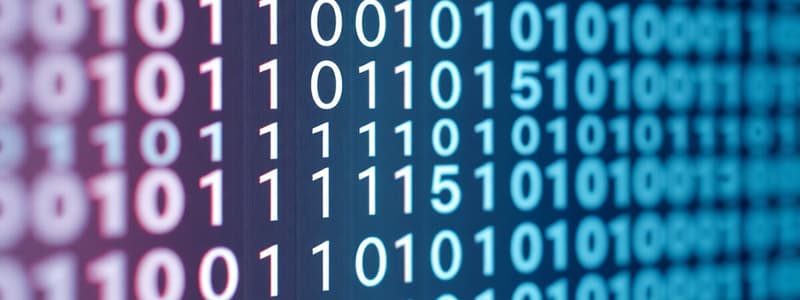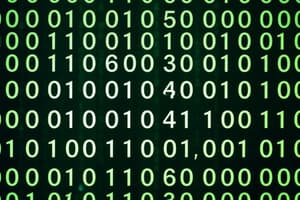Podcast
Questions and Answers
What is the base of the decimal number system?
What is the base of the decimal number system?
10
What is the base of the binary number system?
What is the base of the binary number system?
2
A nibble is a group of 8 bits.
A nibble is a group of 8 bits.
False (B)
Which of the following is a valid hexadecimal number?
Which of the following is a valid hexadecimal number?
Convert the binary number (1101)2 to decimal.
Convert the binary number (1101)2 to decimal.
Convert the decimal number (25)10 to binary.
Convert the decimal number (25)10 to binary.
Binary addition, subtraction, multiplication, and division are all performed using standard arithmetic rules.
Binary addition, subtraction, multiplication, and division are all performed using standard arithmetic rules.
What is the result of the binary addition (1011)2 + (1001)2?
What is the result of the binary addition (1011)2 + (1001)2?
What is the result of the binary subtraction (1101)2 - (101)2?
What is the result of the binary subtraction (1101)2 - (101)2?
What is the result of the binary multiplication (11)2 x (101)2?
What is the result of the binary multiplication (11)2 x (101)2?
Flashcards
Nibble
Nibble
A group of four binary digits (bits).
Byte
Byte
A group of eight binary digits (bits).
Binary Number System
Binary Number System
A number system with base 2, using only 0 and 1.
Octal Number System
Octal Number System
Signup and view all the flashcards
Decimal Number System
Decimal Number System
Signup and view all the flashcards
Hexadecimal Number System
Hexadecimal Number System
Signup and view all the flashcards
Binary Addition
Binary Addition
Signup and view all the flashcards
Binary Subtraction
Binary Subtraction
Signup and view all the flashcards
Binary Multiplication
Binary Multiplication
Signup and view all the flashcards
Binary Division
Binary Division
Signup and view all the flashcards
Binary to Decimal Conversion
Binary to Decimal Conversion
Signup and view all the flashcards
Decimal to Binary Conversion
Decimal to Binary Conversion
Signup and view all the flashcards
Study Notes
Number Systems
- Binary numbers use only 0 and 1.
- Binary numbers are the foundation for modern computing.
- A nibble is a group of four digits (4 bits).
- A byte is a group of eight digits (8 bits).
Types of Number Systems
- Binary: Base 2
- Octal: Base 8
- Decimal: Base 10
- Hexadecimal: Base 16
Number System Table
| Binary (Base-2) | Decimal (Base-10) | Octal (Base-8) | Hexadecimal (Base-16) |
|---|---|---|---|
| 0000 | 0 | 0 | 0 |
| 0001 | 1 | 1 | 1 |
| 0010 | 2 | 2 | 2 |
| 0011 | 3 | 3 | 3 |
| 0100 | 4 | 4 | 4 |
| ... | ... | ... | ... |
| 1111 | 15 | 17 | F |
Binary Arithmetic Operations
- Addition: Follows a simple set of rules for adding binary digits.
- Subtraction: A similar set of rules for binary subtraction.
- Multiplication: Binary multiplication follows the same underlying principles as decimal multiplication.
- Division: Binary division uses procedures similar to decimal division.
Conversions
- Binary to Decimal: Multiply each binary digit by the corresponding power of 2 and sum the results.
- Decimal to Binary: Divide the decimal number by 2 repeatedly, recording the remainders, until the quotient is 0. The remainders, written from bottom to top, give the binary equivalent.
Decimal Number System
- Uses digits 0 through 9.
- Based on powers of 10.
Octal Number System
- Uses digits 0 through 7.
- Based on powers of 8.
Hexadecimal Number System
- Uses digits 0 through 9 and letters A through F.
- Based on powers of 16.
Studying That Suits You
Use AI to generate personalized quizzes and flashcards to suit your learning preferences.




